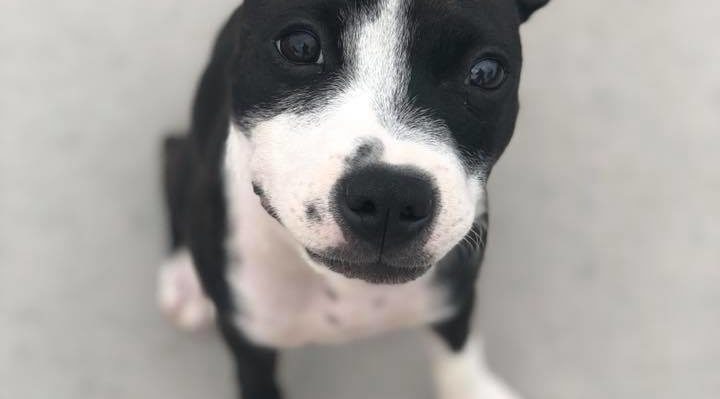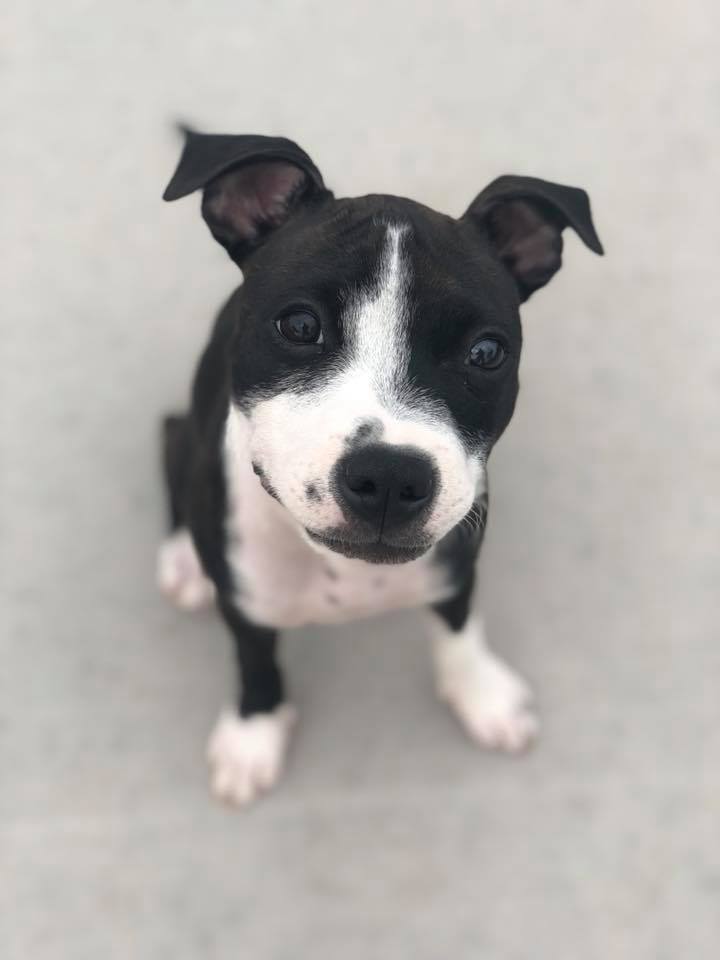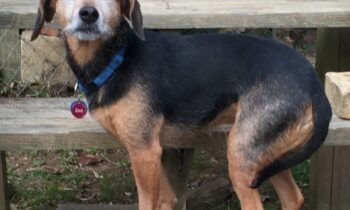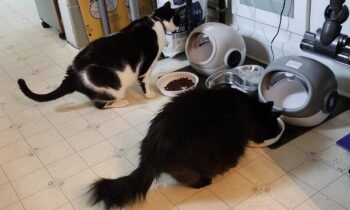
Dogs jumping up on people inappropriately is one of the most common complaints of dog owners, dog lovers, and those not fond of dogs or allergic to them. If their own family’s dogs do not jump up, other dogs jump up on them—or on their children, or on their fragile family members.
Why do dogs jump up?
There are many reasons why a dog might jump up on a human.
Dogs are usually shorter than the humans around them, so it’s only natural for dogs to jump up to be closer to the human’s hands or face.
Watch baby puppies with their mother as she walks around. They follow her everywhere, as soon as they are old enough to be mobile, launching themselves at her underside in hopes of a chance to nurse. They “mob” their mother’s face, licking at her muzzle, eyes, nose, ears. They solicit attention from the most important animal in their world and they usually get it!
When humans join the mix, puppy behavior is not all that different, as anyone who’s held a puppy can tell you. They nibble at your fingers, they lick your chin, they grab at your hair. Put them on the floor and stand up—the puppies work hard to get as close to “you” as possible, climbing up your pants legs, flinging themselves at your ankles or knees. Lean down and the puppies seek your hands.
Puppies don’t discard the jumping-up behaviors as they mature. In many cases, they exhibit those behaviors with even more energy and excitement as they grow. They can jump higher and with more accuracy! When a puppy of any size learns to jump up onto the lap of a sitting person, when a puppy of any age learns how to cannonball your legs when you’re walking . . . you start to see how jumping up can be dangerous, even under normal circumstances.
There will be a first time that the puppy jumps up and hurts you.
You will react instinctively.
You will yelp.
You will pull away.
You will push the puppy off you.
You will voice your displeasure.

Photo by Amber Abbott
You can’t help those reactions.
How loud you yelp, how hard you pull away, how forcefully you push—what words you say, if any, and in what tone of voice—all those “behaviors” depend on your personality, your experience, your triggers. Your reactions are instinctive. You are reacting like a normal human.
Will your puppy understand your reactions?
No.
Your puppy’s comprehension of the “meaning” of your reactions will be based on his personality, experience, and triggers. He’s a puppy, so what’s happened to him since birth (some add in utero) until today has been only weeks of experience. This may literally be the first time someone has yelped in front of him. What most puppies probably comprehend is that the situation is not safe.
Will your puppy know not to do that again?
No.
Your puppy doesn’t know what “that” was. He can’t see the cause and effect of his actions. He doesn’t understand what he did or how what he did caused what you did. He certainly is not capable of extrapolating the “lesson” you want him to learn from this experience: Don’t do it again.
Will your puppy hurt you that way again?
Probably.
Your puppy will certainly continue to behave like a puppy. It would be unhealthy for him to do otherwise! A “soft” puppy might become more cautious of proximity to you in similar situations, while a “bold” puppy might show no concern whatsoever. It’s inevitable, though, that your puppy is going to continue to experiment with jumping-up behavior that might hurt you at some point.
What would you like your puppy to know?
You would like your puppy to know that jumping up on people—of any size, any age, any attire, any degree of familiarity, standing or sitting—should not be done by him.
You want your puppy to learn to control his impulse to jump up.
You want your puppy not to jump up except when cued (asked to do it).
In human terms, that’s clear enough.
In dog terms? You want him to know that jumping up is not rewarding.
Behavior that is rewarded will continue.
Don’t reward the behavior of jumping up.
What’s rewarding varies from dog to dog.
Your puppy might like your yelping, your pulling away, your pushing, your tone of voice, your facial expression, or any other part of your behavior in reaction to his jumping up. Those actions on your part might be rewarding to him. He might be rewarded by the attention you’re giving him.
How will you know if he’s being rewarded?
If the behavior continues, he’s being rewarded.
You want to know what to do instead?
▪ Don’t react instinctively.
Remain in control of your own impulses.
▪ Give his behavior as little attention as possible. That’s not always easy, especially if you’re hurt. Practice when his jumping up is not so energetic to give yourself a slight advantage.
▪ When jumping up starts, turn around and walk away.
▪ If the puppy hurls himself at you with even more enthusiasm when you’re moving, try walking to a wall. Stand facing the wall with your hands out of reach.
Does the jumping-up behavior decrease?
It might get worse before it gets better, so don’t give up too easily. (That’s called an “extinction burst,” and it’s normal for that to happen before you see the behavior lessen.)
Be honest with yourself. What else might you be doing in reaction to the dog’s jumping up that’s encouraging his behavior by rewarding it? Are there some times you like being jumped up on by your puppy? Are you somehow expressing your enjoyment in a way that’s rewarding to the pup?
Later, if you want, you can teach your dog to “jump up” on cue, when you ask him to. Right now, don’t confuse the puppy with bad information. Not jumping up is the default behavior you want, so don’t inadvertently reward jumping up because you find it pleasurable or cute. Keep it simple!
Teach the children in your puppy’s life by modeling the behavior.
▪ Act it out with them role-playing the part of the puppy, then switch so that you’re the puppy and they ignore the behavior of jumping up. Reward the kids as they practice with encouragement and praise!
▪ Enroll your family and your puppy in a positive-training puppy class to discover all the good behaviors that can replace jumping up, and to learn to teach those behaviors to your puppy with kindness and love while he’s still very young.
What about adult dogs that jump up on people?
Make a list of what you think might be rewarding to that adult dog about jumping up on people. The older the dog, the longer she’s had to build up a history. The more often she’s been rewarded for jumping up, the more difficult a job it might be to change her behavior by eliminating those rewards.
Which means the sooner you start, the sooner you can succeed!
Ask for the help of an ethical, educated, and experienced trainer. Enroll in positive training classes offered by a school with an excellent reputation. Ask your veterinarian for recommendations.



